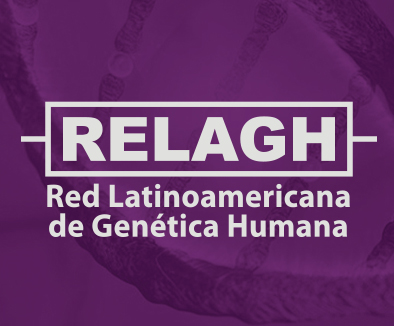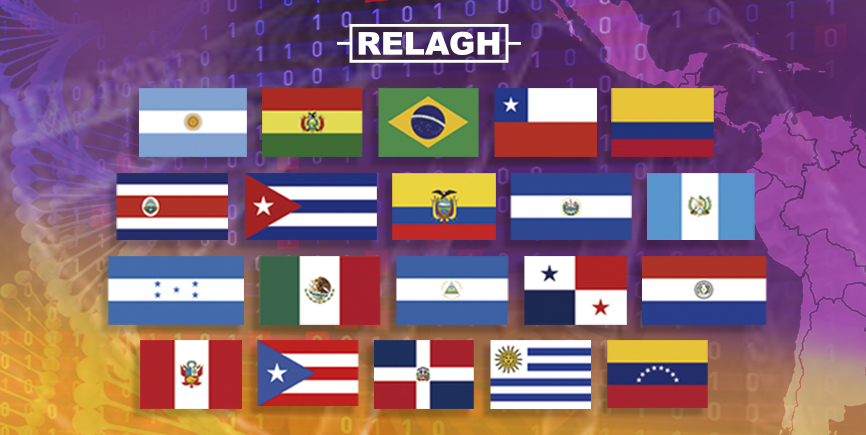
Red Latinoamericana de Genética Humana
Latin America and the Caribbean region make up one of the largest areas of the world, and this region is characterized by a complex mixture of ethnic groups sharing Iberian languages. The area is comprised of nations and regions with different levels of social development. This region has experienced historical advances in the last decades to increase the minimal standards of quality of life; however, several factors, such as concentrated populations in large urban centers and isolated and poor communities, still have an important impact on medical services, particularly genetics services. Latin American researchers have greatly contributed to the development of human genetics and historic inter-ethnic diversity, and the multiplicity of geographic areas are unique for the study of gene-environment interactions. As a result of regional developments in the fields of human and medical genetics, the Latin American Network of Human Genetics (Red Latinoamericana de Genética Humana - RELAGH) was created in 2001 to foster the networking of national associations and societies dedicated to these scientific disciplines. RELAGH has developed important educational activities, such as the Latin American School of Human and Medical Genetics (ELAG), and has held three biannual meetings to encourage international research cooperation among the member countries and international organizations. Since its foundation, RELAGH has been admitted as a full regional member to the International Federation of Human Genetics Societies. This article describes the historical aspects, activities, developments, and challenges that are still faced by the Network.

The Foundation of RELAGH
The idea of creating a Latin American Network of Human Genetics (RELAGH) arose during the IX International Congress of Human Genetics in 1996 in Rio de Janeiro, Brazil, at which the International Federation of Human Genetic Societies was created. Several Latin American societies of human and medical genetics applied for membership to the new organization. After establishing that the Executive Committee of the IFHGS would include representatives of societies in Europe, United States, Canada, Australia, and Asia as full members, this committee suggested that Latin America could form a regional representative group. In 1997, a meeting was held in San Juan de el Río, Queretaro, Mexico; at this time, representatives of the human genetics field from a dozen Latin American countries, and Dr. Marcus Pembrey, the IFHGS representative, organized RELAGH, stating that such a network would represent not only human genetics societies, but also persons in those countries that do not have associations or societies.
A meeting in 1999 in Buenos Aires, Argentina, primarily attended by ECLAMC members, resulted in the nomination of an Organizing Committee that consisted of representatives from Brazil, Argentina, and Mexico. Several difficulties were overcome in the following years; therefore, in Vienna, Austria, during the 10th International Congress of Human Genetics in May 2001, RELAGH was formally established through the participation of the Presidents of five groups: the branch of Human Genetics of the Sociedad Argentina de Genética, the Sociedade Brasileira de Genética Médica, the Asociación Colombiana de Genética Humana, the Asociación Mexicana de Genética Humana, and the Sociedad Panameña de Genética Humana. Dr. José María Cantú (Mexico) was appointed the Acting President for two years, and he agreed to create an assembly to evaluate the proposed governing statutes of RELAGH and chose the first Board of Directors. Dr. Roberto Giugliani (Brazil) was proposed as the RELAGH operator. During the IFHGS meeting at the same Congress, RELAGH was accepted as a full member and part of its Executive Committee.
In 2003, a new Board of Directors was appointed during the Presidency of Roberto Giugliani (Brazil). This board decided to form an Executive Committee to address the practical activities of the young network. This committee was based in Porto Alegre, Brazil and was formed by Roberto Giugliani and Ursula Matte (Chairpersons). The primary goals for this period were to draft and propose the bylaws of the network; to consolidate RELAGH as a representative of Latin America in the IFHGS; to set up the network website and use it as the main communication tool between RELAGH members; to expand the RELAGH membership, and promote RELAGH as a hub for collaboration among human genetics groups in the Latin American region; and to organize the Latin American School of Human and Medical Genetics (ELAG). Having achieved all of these goals, the RELAGH presidency was transferred to the new board of directors in 2006 (no business meeting was held in 2005). The Executive Committee decided to continue its activity and became the Organizing Committee of the ELAG, which has been a very successful course since 2005.
The bylaws of the network were initially established in March 2004 and modified in 2008 during the First Latin American Congress of Human Genetics in Cartagena, Colombia. Thereafter, RELAGH has been led by the following presidents: Dr. Alejandro Giraldo-Ríos (2006–2008), Dr. Gerardo Jiménez-Arce (Costa Rica, 2008–2011), and Dr. Augusto Rojas-Martínez (Mexico, 2011–2013); RELAGH is currently led by Dr. Aída Falcón de Vargas (Venezuela, 2013–2015).
More information visit website